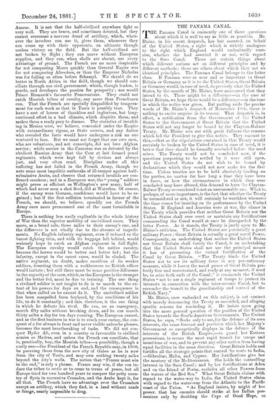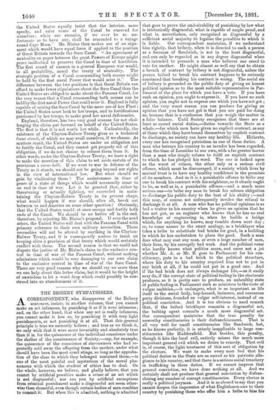THE PANAMA CANAL.
THE Panama Canal is eminently one of those questions about which it is well to say as little as possible. Mr. Blaine, in his recent despatch, has but asserted, on behalf of the United States, a right which is strictly analogous to the right which England would undoubtedly exer- cise, whether she had asserted it or not, with regard
to the Suez Canal. There are certain things about which different nations act on different principles and by different methods ; there are others about which they act on identical principles. The Panama Canal belongs to the latter class. If Panama were as near and as important to Great Britain or Germany as it is to the United States, Great Britain or Germany would, in case of need, do precisely what the United States, by the mouth of Mr. Blaine, have announced that they intend to do. There might be a difference—in the case of Great Britain, we hope there would be a difference—in the tone in which the notice was given. But putting aside the precise words of Mr. Blaine's despatch of November 19th. there is nothing to excite surprise in its tenour. That despatch is, in effect, a notification from the Government of the United States to the Government of Great Britain that the United States will not any longer be bound by the Clayton-Bulwer Treaty. Mr. Blaine sets out with great fullness the reasons which led the President to give this notice. They amount to this,—that as the stipulations contained in that Treaty would certainly be broken by the United States in case of need, it is better that they should be formally rescinded before the need arises. The Treaty would not be concluded now, if the questions purporting to be settled by it were still open, and the United States do not wish to be bound by declarations which they would not now make for the first time. Unless treaties are to be held absolutely binding on the parties, no matter for how long a time they have been in force, or how the circumstances in which they were concluded may have altered, this demand to have the Clayton- Bulwer Treaty reconsidered is not an unreasonable one. What is, perhaps, of more importance, is the fact that whether the Treaty be reconsidered or not, it will certainly be worthless whenever the time comes for insisting on its performance by the United States. If England and America were at war, the clause in the Treaty which provides that neither Great Britain nor the United States shall ever erect or maintain any fortifications commanding the Canal would at once be disregarded by the latter Power. As it stands, the Treaty is justly open to Mr. Blaine's criticism. The United States are potentially a great military Power ; Great Britain is actually a great naval Power. Consequently, an undertaking that neither the United States nor Great Britain shall fortify the Canal, is an undertaking that the United States shall not use the principal means it has of preventing the virtual fortification of the Canal by Great Britain. " The Treaty binds the United States not to use its military force in any precautionary measure, while it leaves the naval power of Great Britain per- fectly free and unrestrained, and ready at any moment, if need be, to seize both ends of the Canal ;" it commands the United States " not to use a single regiment of troops to protect its interests in connection with the inter-oceanic Canal, but to surrender the transit to the guardianship and control of the British Navy." Mr. Blaine, once embarked on this subject, is not content with merely denouncing the Treaty as one-sided, and alleging specific reasons for rescinding it. He insists upon going into the more general question of the position of the United States towards the South-American Governments. The United States, lie says, " Seeks only to use, for the defence of its own interests, the same forecast and prevision which her Majesty's Government so energetically displays in the defence of the interests of the British Empire,—to guard her Eastern possessions, to secure the most rapid transit for troops and munitions of war, and to prevent any other nation from having equal facilities in the same direction. Great Britain holds and fortifies all the strategic points that control the route to India, —Gibraltar, Malta, and Cyprus. Her fortifications give her the mastery of the Mediterranean. She holds the controlling interest in the Suez Canal ; and by her fortifications at Aden and on the Island of Perim, excludes all other Powers from the waters of the Red Sea." What Great Britain claims with regard to the water-way to India, the United States claim with regard to the water-way from the Atlantic to the Pulite coast of the Union. " As England insists, by might of her power, that her enemies should strike at her Indian pos- sessions only by doubling the Cape of Good Hope, so the United States equally insist that the interior, more speedy, and safer route of the Canal be reserved for ourselves ; while our enemies, if we ever be so un- fortunate as to have any, shall be remanded to a voyage round Cape Horn." Mr. Blaine then makes use of an argu- ment which would have equal force if applied to the position of Great Britain towards the Suez Canal. " An agreement of neutrality on paper between the great Powers of Europe might prove ineffectual to preserve the Canal in time of hostilities. The first sound of cannon in a general European war would, in all probability, annul the treaty of neutrality. The strategic position of a Canal commanding both oceans might be held by the first naval Power that would seize it." The difference between the two positions is that Great Britain can afford to make fewer stipulations about the Suez Canal than the United States are obliged to make about the Panama Canal, for the very reason that a Canal commanding both oceans can be held by the first naval Power that could seize it. England is fully capable of seizing the Suez Canal by the mere use of her Fleet ; the United States must look to her troops, and to fortifications garrisoned by her troops, to make good her naval deficiencies.
England, therefore, has two very good reasons for not chal- lenging the claim put forward on behalf of the United States. The first is that it is not worth her while. Undoubtedly, the existence of the Clayton-Bulwer Treaty gives us a technical locus standi, of which we may avail ourselves, if we choose. As matters stand, the United States are under an obligation not to fortify the Canal, and they cannot get properly rid of this obligation, if we do not choose to release them from it. In other words, under the Clayton-Bulwer Treaty, we have a right to make the assertion of this claim to set aside certain of its provisions a casus tell. If we went to war in defence of the Treaty as it stands, we should not be going beyond our rights
in the view of international law. But what should we gain by vindicating them ? The maintenance in time of peace of a state of things which would necessarily come to an end in time of war. Let it be granted that, either by threatening or actually fighting, we succeeded in main- taining the Clayton-Bulwer Treaty in its present shape, what would happen if war should, after all, break out between us and America on some other question ? Obviously, that the United States would at once occupy and fortify both ends of the Canal. We should be no better off in the end, therefore, by rejecting Mr. Blaine's proposal. If ever the need arises, the United States will deal with the Panama Canal with primary reference to their own military necessities. Those necessities will not be altered by anything in the Clayton- Bulwer Treaty, and it is consequently useless to insist on keeping alive a provision of that treaty which would certainly conflict with them. The second reason is that we could not dispute the justice of Mr. Blaine's claim to the exclusive con- trol in time of war of the Panama Canal, without making admissions which would be very damaging to our own claim
to the exclusive control in time of war of the Suez Canal. There are very good reasons why we should say no more than we can help about this latter claim, but it would be the height of unwisdom to let a word drop which could possibly be con- strued into an abandonment of it.







































 Previous page
Previous page